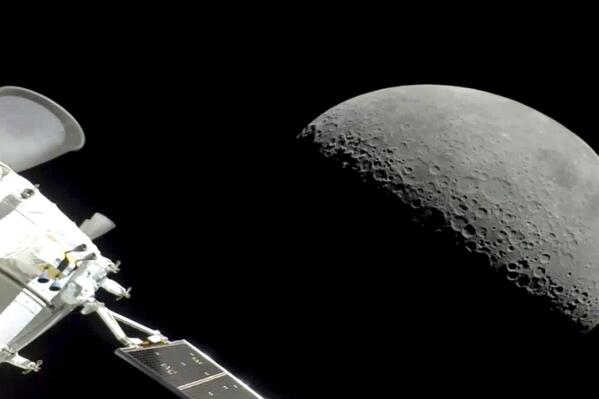Science
Belgium authorities are getting worried by a series of school arsons believed to be connected to newly mandatory school sessions in some parts of the country.
More news
The Sioux Falls mayor announced a “strategic pause” in the city’s plans to ditch an arsenic-contaminated menagerie of more than 150 taxidermy animals that fill a now-closed natural history museum at the state’s largest zoo.
Counting nose hairs in cadavers, repurposing dead spiders and explaining why scientists lick rocks, are among the winning achievements in this year’s Ig Nobels, the prize for humorous scientific feats.
New England will feel some effects from Hurricane Lee but is usually protected from the worst of a hurricane’s wrath by the cold waters of the North Atlantic.
A new study of Earth’s health says the planet is outside its “safe operating space for humanity” on six out of nine key measurements.
The Russian space launch facility where President Vladimir Putin has hosted North Korean leader Kim Jong Un reflects an ambitious attempt by Moscow to burnish its scientific glory that faded after the Soviet collapse.
The National Hurricane Center has issued a hurricane watch for portions of Maine and a tropical storm watch for a large area of coastal New England as Hurricane Lee heads to the region.
Preventing dengue fever has long meant teaching people to fear mosquitoes and avoid their bites. Now scientists are promoting a new way to control the disease with the help of mosquitoes.
If ever there was an inspirational story about reaching for the stars, it’s “A Million Miles Away,” about the real-life journey of how a boy who grew up as a migrant farmworker became a NASA astronaut.
NASA astronaut Frank Rubio now holds the record for the longest U.S. spaceflight. Rubio surpassed the U.S. record of 355 days on Monday at the International Space Station.
As American schools work to turn around math scores that plunged during the pandemic, some researchers are pushing for more attention to a set of research-based practices for teaching math.
An American literary historian, a French paleoanthropologist, a Danish evolutionary geneticist and a German-Dutch radio astronomer have been named the winners of this year’s Balzan Prize.
As the U.S. races to build offshore wind power projects that will transform coastlines from Maine to South Carolina, much remains unknown about how the facilities could affect the environment.
The operator of the wrecked Fukushima nuclear power plant says it has safely completed the first release of treated radioactive water from the plant into the sea and will inspect and clean the facility before starting the second round in a few weeks.
A major rescue operation in Turkey’s Taurus Mountains has brought out an American researcher who fell seriously ill nine days ago, about 3,000 feet from the entrance of one of world’s deepest caves.
An earthquake has sown destruction and devastation in Morocco. The death and injury counts continue to rise as rescue crews dig out people both alive and dead in villages that were reduced to rubble.
The earthquake that struck Morocco late Friday has killed more than 2,100 people and the toll is expected to increase as rescuers reach hard-hit remote mountain areas.
Experts say that Hurricane Lee is rewriting old rules of meteorology. It left meteorologists astonished at how rapidly it grew into a goliath Category 5 hurricane.
The world is far off track on its 2015 pledge to curb global warming. A new United Nations report central to upcoming climate negotiations details how deeply energy and financial systems must change to get back on a safer path.
A retired pediatrician from Pittsburgh who helped create the ‘Mr. Yuk’ poison warning for kids has died. Dr. Richard W. Moriarty was 83.
The Federal Aviation Administration says SpaceX must take a series of steps before it can launch its mega rocket again.
U.N. Secretary-General António Guterres has urged the Group of 20 top economic powers to use their weekend summit to send a strong message on climate change.
Students and teachers are sweltering in public schools across Puerto Rico and demanding that the government install air conditioners as the U.S.
Fishermen and residents of Fukushima and five other prefectures along Japan’s northeastern coast have filed a lawsuit demanding a halt to the ongoing release of treated radioactive wastewater from the wrecked Fukushima nuclear plant into the sea.
A Norwegian man using a metal detector has found nine pendants, three rings and 10 gold pearls someone might have worn as showy jewelry 1,500 years ago.
Britain is rejoining the European Union’s $100-billion science-sharing program. The news announced Thursday comes more than two years after Britain’s membership in Horizon Europe became a casualty of Brexit.
Japan has launched a rocket with an X-ray telescope that will explore the origins of the universe. The HII-A rocket’s liftoff from Tanegashima Space Center in southwestern Japan was shown on live video by the Japan Aerospace Exploration Agency.
The Biden administration has canceled the remaining seven oil and gas leases in Alaska’s Arctic National Wildlife Refuge, overturning sales held in the Trump administration’s waning days and angering Republicans.
Across the Northern Hemisphere, now’s the time to catch a new comet before it vanishes for 400 years
A newly discovered comet is swinging through our cosmic neighborhood for the first time in more than 400 years.
Crab fishermen in Alaska have been scrambling to stay afloat after two years of the Bering Sea fishery being closed or severely curtailed due to plummeting crab numbers.
Israeli archaeologists have discovered four Roman-era swords with their wooden and leather hilts and scabbards and steel blades exquisitely preserved after 1,900 years in a desert cave near the Dead Sea.


